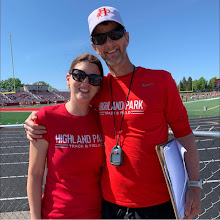If it doesn’t come across in my writing, I’m a pretty analytical/logical thinker. I work in marketing and we’re currently working on our sale forecast for next year. Everything we put into our analysis is based on previous years’ results and trends. I was thinking that some of these similar thought processes carry over to my running.
As I near the end of November, I looked back at my mileage and workouts from 2005 and 2006 and evaluated how they compare to this year. Given that I didn’t run a fall marathon, it’s no surprise that I’m basically a month ahead of where I was during the last two years – that was the plan when I decided to skip TCM.
Then, of course, I peeked at December, January, and February to get a sense for what lies ahead. 2005 was my “mileage experiment” year – with only a handful of 80-mile weeks ever, up to that point, I went on to post eight weeks between 80 and 100 mpw between December and March. 2006 was more about getting in some longer tempo runs than just piling on mileage. I was content to keep nearly all of my weeks below 80, but included lots of 6-10 mile runs at marathon pace.
Finally, I started to look at race results from early spring. 2005’s winter training led to a 1:24:45 half, 29:15 8K, and 1:17:57 20K, which, for those of us can relate to half marathon times better, equates to roughly a 1:22:16. 2006’s winter training led to 1:24:06 half, 29:33 8K, 37:47 10K, 1:21:49 half, 17:52 5K, and a 2:57:29 marathon.
What do those results mean?
I don’t know. I guess they mean I tend to run well in the spring as long as I’m putting in solid training over the winter.
Duh!
But it did get me thinking, “What do I have to do differently to see some different (i.e. better) results?” I mean if I continue with the path I’m on, am I going to run a 1:24 half, 29:20 8K and a 2:57 marathon in 2008?
Granted, I have a long way to go between now the racing season. Hopefully the subtle changes (hillier runs, more mileage in singles, moderately hard runs followed by long runs), along with the month “head start” will bode well for the Boston Marathon, which I just registered for – to answer Wynn’s question from yesterday.
Quote of the day;
“A trap runners fall into during the conditioning phase is running too much of their mileage at too high of an effort... ‘Never take away from tomorrow’s workout’ is a very important mantra to be thinking about during the base phase.” - Mystery Coach

2 comments:
I like the idea of trying to identify trends in the cycles. I've only been running for four years. As I looked at my logs this spring, it seemed that the time that I logged the most consistent weeks with the least effort were between the months of August to December. So, this year I skipped a fall marathon and signed up for one in December to see if that made any difference. I'll let you know in two weeks - if nothing else it will be nice to recover on the holidays.
Yeah, let me know how it goes. I usually run well in March-May, so Boston tends to fit well for me.
Post a Comment